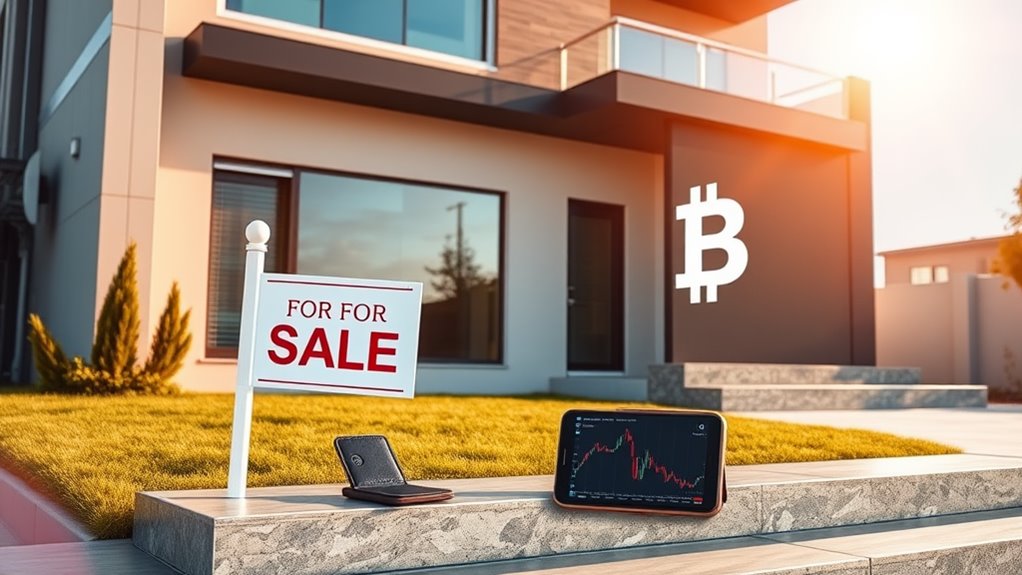Crypto real estate investing lets you use cryptocurrencies like Bitcoin and Ethereum to purchase property, leveraging blockchain for transparency and efficiency. Platforms like HoneyBricks and RealT enable fractional ownership, lowering entry costs, while smart contracts automate processes. The global real estate market, valued at $317 trillion, becomes more accessible, with tokenized assets boosting liquidity. Challenges include regulatory uncertainty and market volatility, but growth potential is significant. Discover how blockchain can transform your investment strategy.
Key Takeaways
- Crypto real estate investing uses cryptocurrencies and blockchain for secure, transparent property transactions.
- Tokenized real estate allows fractional ownership, lowering entry costs for high-value properties.
- Smart contracts automate agreements, reducing intermediaries and administrative expenses in real estate deals.
- Platforms like HoneyBricks and RealT enable fractional investments starting as low as $50.
- Crypto real estate faces challenges like regulatory uncertainty and market volatility despite its growth potential.
What Is Crypto Real Estate Investing?
Crypto real estate investing revolutionizes property transactions by leveraging cryptocurrencies like Bitcoin and Ethereum for purchasing, selling, or investing in both physical and digital real estate assets. This innovative approach integrates blockchain technology to enhance transparency, security, and efficiency in real estate transactions. With tokenized real estate, fractional ownership becomes accessible as properties are divided into digital assets represented by tokens on a blockchain. Smart contracts automate and enforce agreements, reducing intermediaries and ensuring compliance. Decentralized finance (DeFi) platforms further enable investors to use their cryptocurrency holdings for real estate investments without liquidating their digital assets. By lowering minimum investment thresholds, crypto real estate investing democratizes access to a market valued at $317 trillion globally. Tokenization could free a trillion-dollar market, even at a 0.5% adoption rate. This model bridges traditional real estate investing with the flexibility of cryptocurrency, creating a seamless, scalable, and inclusive ecosystem.
Benefits of Tokenized Real Estate
As blockchain technology transforms traditional asset classes, tokenized real estate introduces a groundbreaking shift by enabling fractional ownership, which allows investors to access high-value properties with minimal capital, often starting as low as $10. This democratizes global real estate investments, making them accessible to a broader audience. Blockchain technology guarantees transparency and security by recording all transactions on a public ledger, reducing fraud risks. Smart contracts automate the investment process, streamlining ownership verification and compliance while minimizing administrative costs. Tokenized real estate also enhances liquidity, enabling you to trade digital property tokens on various platforms, unlike traditional real estate investments where exiting can be cumbersome. The global tokenized real estate market, valued at $200 million, represents a fraction of the $317 trillion traditional market, indicating immense growth potential. By leveraging these innovations, you gain exposure to global real estate markets with lower barriers to entry and improved operational efficiency.
Platforms for Crypto Real Estate Investments

You can explore platforms like HoneyBricks for commercial real estate investments with minimal fees, or consider Roofstock, which has facilitated over $5 billion in single-family rental transactions. RealT offers fractional ownership starting at $50, while Vave targets financial independence with investments as low as $10. SolidBlock integrates NFT and Metaverse features, enhancing both accessibility and educational resources for sellers.
Top Investment Platforms
Several platforms are transforming the landscape of real estate investment by leveraging crypto and tokenization technologies. Roofstock enables you to diversify your investment portfolio through Real Estate Tokenization, offering single-family rental properties with over $5 billion in transactions. HoneyBricks focuses on commercial real estate, allowing you to invest in real estate with low minimums and no buyer fees, enhancing accessibility. RealT provides fractional ownership opportunities, letting you buy a token representing part of a property with a minimum investment of $50. SolidBlock leverages blockchain platforms to educate sellers and explore NFTs and the Metaverse. Vave offers crypto investments starting at $10, fostering cash flow generation in the French-speaking market. These platforms democratize buying a property, making real estate investment more inclusive and efficient.
Tokenization Benefits Explained
Tokenization revolutionizes real estate investment by enabling fractional ownership through digital tokens, lowering entry barriers and increasing market accessibility. Tokenized platforms allow you to invest in high-value commercial property with minimal capital, often as low as $100, making it feasible for broader investor participation. The global real estate market, valued at US$317 trillion, contrasts sharply with the current US$200 million tokenized sector, highlighting its growth potential. Smart contracts automate compliance and ownership verification, ensuring security and transparency in transactions. Additionally, tokenized assets can be traded on digital platforms, enhancing liquidity compared to traditional real estate investments. Platforms like HoneyBricks specialize in fractional ownership of commercial property, offering crypto investors low minimums and zero direct fees, further democratizing access to this lucrative asset class.
Challenges in Crypto Real Estate
Although cryptocurrency has gained traction in real estate, its adoption faces significant challenges. When you use crypto to buy real estate, regulatory uncertainties often complicate transactions, as governments worldwide struggle to classify digital currencies. Market volatility further increases the risk and potential of these investments, making property ownership less predictable compared to traditional forms of real estate. Tax liabilities also arise, as converting crypto to fiat or using it directly in transactions can trigger capital gains taxes, adding financial complexity. Additionally, some jurisdictions restrict access to investing in real estate with crypto to accredited investors, limiting participation.
| Challenge | Impact |
|---|---|
| Regulatory uncertainties | Complicates transaction process |
| Market volatility | Increases investment risk |
| Tax liabilities | Adds financial complexity |
Strategies for Diversifying With Crypto and Real Estate

By integrating crypto and real estate into your portfolio, you can balance high-growth potential with stable cash flow, optimizing risk-adjusted returns. Tokenized real estate platforms like HoneyBricks and RealT enable fractional ownership of real estate, allowing you to diversify across multiple properties using minimal capital, often as low as $10. This approach reduces exposure to the risk associated with any single asset in the real estate market. Combining crypto and real estate investments mitigates volatility, as the cash flow from real estate investments offsets crypto’s price fluctuations. Investing in tokenized real estate also enhances accessibility, letting you participate in high-value properties without full ownership. Additionally, crypto-backed loans provide liquidity, enabling you to fund real estate investments while retaining your cryptocurrency holdings. This dual strategy strengthens your portfolio by leveraging the stability of real estate and the growth potential of using cryptocurrency, optimizing diversification with crypto and real.
Future Trends in Blockchain-Based Real Estate
As blockchain technology evolves, it’s reshaping the real estate industry by enabling innovative solutions such as tokenization and smart contracts. By tokenizing real estate, investors can access fractional ownership of property ownership through digital tokens, democratizing access to high-value asset classes. The blockchain real estate market, currently valued at $200 million, is projected to grow exponentially, with a 0.5% tokenization rate of the $317 trillion global real estate market potentially creating a trillion-dollar industry. Smart contracts streamline transactions, guaranteeing transparency and reducing processing times by automating compliance and ownership verification. Institutional investors looking to diversify are increasingly exploring blockchain real estate investments, with major firms like BlackRock signaling interest in tokenizing assets. This shift not only enhances liquidity but also allows for seamless cross-border investments. Blockchain’s immutable ledger guarantees trust, making it a cornerstone for the future of real estate investment.
tConclusion
Crypto real estate investing allows you to diversify assets by blending traditional property with blockchain innovation. You’ll benefit from fractional ownership, increased liquidity, and global accessibility through tokenization. Platforms like RealT and Propy simplify transactions, yet challenges like regulatory uncertainty remain. By combining crypto and real estate, you can hedge against market volatility. Isn’t it time to rethink your portfolio strategy? Blockchain’s transparency and efficiency are reshaping real estate’s future—will you adapt?




